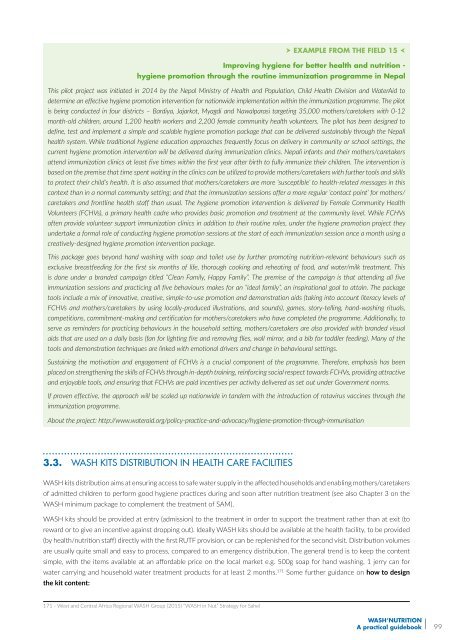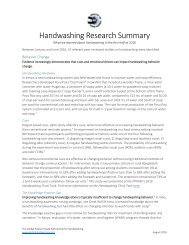WASH’ Nutrition
manuel_wash_nutrition_online
manuel_wash_nutrition_online
You also want an ePaper? Increase the reach of your titles
YUMPU automatically turns print PDFs into web optimized ePapers that Google loves.
EXAMPLE FROM THE FIELD 15 <br />
Improving hygiene for better health and nutrition -<br />
hygiene promotion through the routine immunization programme in Nepal<br />
This pilot project was initiated in 2014 by the Nepal Ministry of Health and Population, Child Health Division and WaterAid to<br />
determine an effective hygiene promotion intervention for nationwide implementation within the immunization programme. The pilot<br />
is being conducted in four districts – Bardiya, Jajarkot, Myagdi and Nawalparasi targeting 35,000 mothers/caretakers with 0-12<br />
month-old children, around 1,200 health workers and 2,200 female community health volunteers. The pilot has been designed to<br />
define, test and implement a simple and scalable hygiene promotion package that can be delivered sustainably through the Nepali<br />
health system. While traditional hygiene education approaches frequently focus on delivery in community or school settings, the<br />
current hygiene promotion intervention will be delivered during immunization clinics. Nepali infants and their mothers/caretakers<br />
attend immunization clinics at least five times within the first year after birth to fully immunize their children. The intervention is<br />
based on the premise that time spent waiting in the clinics can be utilized to provide mothers/caretakers with further tools and skills<br />
to protect their child’s health. It is also assumed that mothers/caretakers are more ‘susceptible’ to health-related messages in this<br />
context than in a normal community setting; and that the immunization sessions offer a more regular ‘contact point’ for mothers/<br />
caretakers and frontline health staff than usual. The hygiene promotion intervention is delivered by Female Community Health<br />
Volunteers (FCHVs), a primary health cadre who provides basic promotion and treatment at the community level. While FCHVs<br />
often provide volunteer support immunization clinics in addition to their routine roles, under the hygiene promotion project they<br />
undertake a formal role of conducting hygiene promotion sessions at the start of each immunization session once a month using a<br />
creatively-designed hygiene promotion intervention package.<br />
This package goes beyond hand washing with soap and toilet use by further promoting nutrition-relevant behaviours such as<br />
exclusive breastfeeding for the first six months of life, thorough cooking and reheating of food, and water/milk treatment. This<br />
is done under a branded campaign titled “Clean Family, Happy Family”. The premise of the campaign is that attending all five<br />
immunization sessions and practicing all five behaviours makes for an “ideal family”, an inspirational goal to attain. The package<br />
tools include a mix of innovative, creative, simple-to-use promotion and demonstration aids (taking into account literacy levels of<br />
FCHVs and mothers/caretakers by using locally-produced illustrations, and sounds), games, story-telling, hand-washing rituals,<br />
competitions, commitment-making and certification for mothers/caretakers who have completed the programme. Additionally, to<br />
serve as reminders for practicing behaviours in the household setting, mothers/caretakers are also provided with branded visual<br />
aids that are used on a daily basis (fan for lighting fire and removing flies, wall mirror, and a bib for toddler feeding). Many of the<br />
tools and demonstration techniques are linked with emotional drivers and change in behavioural settings.<br />
Sustaining the motivation and engagement of FCHVs is a crucial component of the programme. Therefore, emphasis has been<br />
placed on strengthening the skills of FCHVs through in-depth training, reinforcing social respect towards FCHVs, providing attractive<br />
and enjoyable tools, and ensuring that FCHVs are paid incentives per activity delivered as set out under Government norms.<br />
If proven effective, the approach will be scaled up nationwide in tandem with the introduction of rotavirus vaccines through the<br />
immunization programme.<br />
About the project: http://www.wateraid.org/policy-practice-and-advocacy/hygiene-promotion-through-immunisation<br />
3.3. WASH kitS distribution in health care facilities<br />
WASH kits distribution aims at ensuring access to safe water supply in the affected households and enabling mothers/caretakers<br />
of admitted children to perform good hygiene practices during and soon after nutrition treatment (see also Chapter 3 on the<br />
WASH minimum package to complement the treatment of SAM).<br />
WASH kits should be provided at entry (admission) to the treatment in order to support the treatment rather than at exit (to<br />
reward or to give an incentive against dropping out). Ideally WASH kits should be available at the health facility, to be provided<br />
(by health/nutrition staff) directly with the first RUTF provision, or can be replenished for the second visit. Distribution volumes<br />
are usually quite small and easy to process, compared to an emergency distribution. The general trend is to keep the content<br />
simple, with the items available at an affordable price on the local market e.g. 500g soap for hand washing, 1 jerry can for<br />
water carrying and household water treatment products for at least 2 months. 171 Some further guidance on how to design<br />
the kit content:<br />
171 - West and Central Africa Regional WASH Group (2015) “WASH in Nut” Strategy for Sahel<br />
<strong>WASH’</strong><strong>Nutrition</strong><br />
A practical guidebook<br />
99



